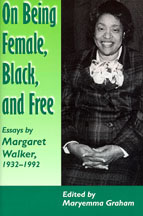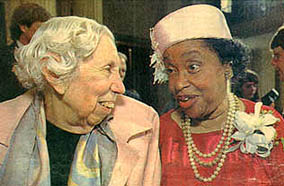Major Works: Books
- Conversations with Margaret Walker, Maryemma Graham (Editor) (2002)
- Jubilee (1966)
- For My People (1942)
- How I Wrote Jubilee (1972)
- October Journey (1973)
- Richard Wright: Daemonic Genius (1987)
- On Being Female, Black, and Free: Essays by Margaret Walker, 1932-1992, Maryemma Graham (Editor)
- How I Wrote Jubilee and other Essays on Life and Literature, Maryemma Graham (Editor) (1990)
Major Works: Poetry
- This is My Century: New and Collected Poems (1989)
- For My People (1942)
- Prophets for A New Day (1970)
Biography of Margaret Walker Alexander
by Melissa E. Wolfe (SHS)
Margaret Walker was born in the summer of 1915 in Birmingham, Alabama. As the daughter of a minister and a teacher, Walker was encouraged to excel. At the age of nineteen, she completed her B. A. in English at Northwestern University in Chicago, Illinois, and one year later joined the Federal Writers’ Project. Walker worked on this project with such prominent writers as Richard Wright and Gwendolyn Brooks. As a result of her friendship with Richard Wright, she later published (1988) Richard Wright, Daemonic Genius: A Portrait of the Man, a Critical Look at His Work.
In 1942 she received her master’s degree in creative writing from the University of Iowa where she also received her Ph. D. in English in 1965. She won the Yale Younger Poets Competition for her book of poetry For My People in 1942. Following her marriage to Firnist Alexander in 1943, she began teaching English at Jackson State University in Jackson, Mississippi, where she taught from 1946-1979. She lived in Jackson until her recent death in December, 1998.
Although best known for her poetry, Margaret Walker has also written an array of essays, interviews, speeches, biographies, and the novel Jubilee, which commemorates her great-grandmother, who survived slavery. In all, Walker produced nine books and many distinguished pieces of writing which mainly celebrate African-American history and culture.
Biography of Margaret Walker Alexander
by Towanda Holmes (SHS)
Margaret Walker received her A.B. from Northwestern University, where she majored in English under Professor Edward Hungerford and began planning her novel. She married, raised a family, and taught.
In 1963 she was awarded a fellowship at the University of Iowa where she received a Ph.D and completed the novel Jubliee in the Creative Writer’s Workshop. By an interesting coincidence, Walker finished her book on April 9, 1965, one hundred years after Appomattox.
She took her final oral exam for her degree the following May 20, exactly one hundred years from the day that her great-grandmother was set free from slavery. Before her retirement Walker was the head of the Black Studies program at Jackson State College in Jackson, Mississippi.
She was awarded the Mississippi Lifetime Achievement Award for Excellence in the Arts and continued to live in Jackson until her death in December, 1998.
Reviews
A Review of Jubilee
by Towanda Holmes (SHS)
Jubilee by Margaret Walker is the story of Vyry, the daughter of the white plantation owner and his black slave mistress, who lived in Georgia in the middle 1800’s. It is a different story of the Civil War era because it is the story of a young heroine who is a black slave girl and her struggles before, during, and after the war. This is another good novel that we as black people should read. It is only necessary to recall that the Civil War novel has been the source of some of the crudest stereotypes of Negro characters in American fiction, but Margaret Walker has changed this picture completely. With facts and details, she presents the little-known everyday life of the slaves: their loves, hopes, fears, struggles, and triumphs.
Vyry is one of the memorable women of contemporary fiction. Jubilee tells the triumph of her free spirit over slavery. The story is well written and interesting. It is also important because it sets the Negro within the frame work of America’s traditional hopes and dreams. I believe that this novel should give black people faith and courage to go on in their daily lives . Walker emphases in her novel what the black people went through and how they struggled to get where they are today.
Human drama spared neither white nor black during the Civil War, and Walker tells her story with compassion for both. Readers who like reading love stories, stories about the Civil War, or stories about the triumph of the spirit over problems should find this story interesting and enjoyable.
Related Websites
- Margaret Walker Center at Jackson State University
- Internet Poetry Archive with audio performances and words to the Walker’s poems
- Essay entitled The Popular Front, the Rural Folk, and Neomodernism: The Case of Margaret Walker by James Smethurst.
- Margaret Walker, poet and novelist (obituary, December 1998) by Maida Odom, Inquirer
 Bibliography
Bibliography
- Davidson, Cathy N., ed. The Oxford Companion to Women’s Writing in the United States
- Walker, Margaret. Jubilee. New York: Bantam, 1966.



